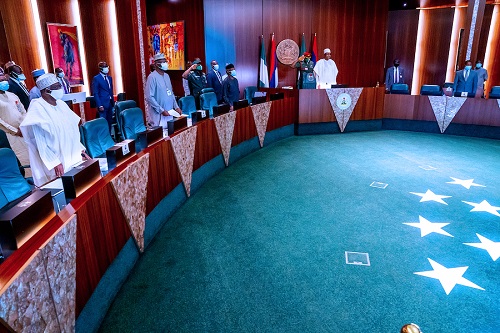This post has already been read 2120 times!
•Plans to introduce rapid diagnostic test on virus after ongoing verification
The Federal Executive Council (FEC) yesterday approved N8.49 billion for the purchase of 12 testing equipment containing large quantities of items, including sample collection material kits to fight COVID-19.
Briefing reporters at the end of the 11th virtual FEC meeting in the State House, the Minister of Health, Dr. Osage Ehanire, said the Presidential Task Force (PTF) approved the resources for the use of Nigeria Centre for Disease Control (NCDC).
According to him, plans had been made to establish sample collection centres in each of the 774 local government areas of the country with a view to ensuring that residents of rural communities are not left to their fate in the fight of COVID-19.
He said: “This memo is as a result of Presidential Task Force on COVID-19 pandemic and special intervention fund for COVID-19 which is operated by the Presidential Task Force. It allocates these resources for NCDC’s preparedness.
“So, we are procuring testing materials right from sample materials to other kits’ diagnostics in our laboratory systems, to be able to respond properly to the community transmission phase.
“We have already made plans to have at least one sample collection center in every local government, minimum of 774 and these resources will be necessary to go around the 774 local government areas, to ensure that persons in rural areas and small towns are not excluded and to ensure that not only the big cities are the ones that are being attended to. So, that is the basis for the memo. The cost is N8.49 billion to procure the items that are involved. There are a total of 12 items, the quantities involved are large numbers which will be sent out later,” he said.
Asked why both the PTF and the Ministry of Health have been reluctant in introducing rapid test kits which can make results of COVID-19 tests available within 10 minutes, the minister who admitted that test kits are used all over the world, gave various reasons for not approving their use in Nigeria.
According to him, the World Health Organisation (WHO) and other medical experts are opposed to rapid test diagnosis as a result of beliefs that it is not reliable because it produces a number of false-positive or false-negative results.
The minister who said the level of accuracy of the rapid diagnosis and otherwise, through the use of rapid test kits, is between the ratio of 60:40, said a diagnosis which produces a 60 percent accuracy rate and 40 percent inaccurate results call for caution.
Submitting that the results of polymerise chain reaction (PCR) tests, on the other hand, are reliable, the minister, however, said the Medical Laboratory Science of Nigeria is currently verifying the rapid diagnosis with a view to ascertaining whether it is reliable or not
He, nevertheless, expressed optimism that as efforts are being made to improve on a rapid diagnostic test, in a matter of months, it will eventually, be introduced into the system.
He said: “It is not that nobody is thinking of rapid diagnostic test, it is being used all over the world even in Nigeria today but the World Health Organisation (WHO) and other experts have said that this test is not very reliable and that it also delivered a significant number of false-positive or false-negative results.
“So, if you go to a place where a percentage of test results can give you the wrong result, then you have to be careful. Whereas the PRC test, that is, the polymerise chain reaction test is accurate and reliable. So, if you want to know how accurate a person is positive, that is the test you ought to do, that is the recommendation of the World Health Organisation.
“Now, science is never certain. There are many ways and avenues by which the quality of the rapid test is still being improved. And as I speak to you now, the Medical Laboratory Science of Nigeria, which is responsible for validating this test, for telling us whether they are reliable or not, whether we should use it or not, they are verifying such test now and they will give us their result, whether it is reliable enough or not reliable enough.
“There is also the anti-body rapid test and the anti-gem rapid test. So, I believe that within a matter of weeks and months, there will be one that will be accurate enough for us to rely on.
“So, those who do the rapid test now, if it is positive, you have to go and confirm with the PRC because the accuracy is questionable. Some of them, their accuracy is 60 percent, which means that 40 percent will be wrong.
“Others are 20 percent wrong which is why rapid diagnostic test (RDT), is not yet officially used in Nigeria. But, I personally believe that as they continue to improve on it, within some months, we shall be able to use it. Meanwhile, we use only the most reliable one, which is PCR.”
Ehanire also spoke on the failure of politicians to observe COVID-19 protocols as shown in the current campaign venues in Edo State and the funeral of the late Senator Buruji Kashamu in Ogun State last weekend, saying concerned authorities look up to politicians to do what is right.
Also echoing Ehanire, the Minister of Information, Alhaji Lai Mohammed, said: “As a matter fact this matter came up at the last PTF briefing, and the coordinator said that we will continue to advise social distancing in whatever gathering. It has been proven that wearing a mask saves many lives and we will continue to harp on it that people should take personal responsibility.”



